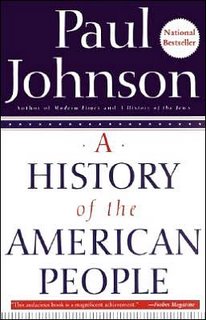America for the Ages

For the record, unless I have something interesting to say, I will normally submit my own pieces sans-preface. But since I've already got this one going... As promised, here is my review of Paul Johnson's A History of the American People, which I wrote at 32,000 feet above the shores of Baja California. - RD
Four centuries of Western influence in North America have seen the development of a remarkable civilization. Throughout the years, those within and without the American project have written vast commentaries on the United States according to what they see as its defining qualities, good or evil. Paul Johnson, in his A History of the American People (HarperCollins, 1996), endeavors to do the same, albeit with the admission that America’s history is both contradictory and difficult.
His task has produced a hefty volume (over 1,000 pages, including extensive footnotes) that successfully treads the line between anecdote and sweeping narrative. Johnson, an English citizen, has done his homework. He provides a fresh outsider’s look at many events that Americans often overlook as grade school fare. See especially the discussions on the Boston Tea Party, the career of Andrew Jackson and Nixon’s decline. But perhaps the most gripping aspect of the book is its author’s knack for finding rare, idiosyncratic quotations from some of America’s best well known figures. These gems range from the astonishingly harsh: “For such a mongrel between pig and puppy, begotten by a wild boar on a bitch wolf, never before in any age of the world was suffered by the poltroonery of mankind, to run through such a career of mischief” (John Adams on Thomas Paine); to the infelicitous: “God is killing mainline Protestantism in America and we goddam deserve it” (Stanley Hauerwas); to the humorous: “Their signs say make love not war, but they didn’t look as if they could do either” (Ronald Reagan); to the mischievous: “If all the girls at a Yale prom were laid end-to-end, I wouldn’t be at all surprised” (Dorothy Parker).
Johnson is nothing if not opinionated. But far from detracting from his work, this feature endears him to the reader, for his judgments are almost always well-balanced, thoughtful and possessed of a strong sense of justice. He is without doubt a conservative, both socially and politically. But he defies the label of “ideologue,” that most pernicious insult among modern political pundits. He does so by adhering strictly to his sense of morality and justice, with special attention to the have-nots. Many great American heroes and programs fail to retain a clean bill of health under the assiduousness with which he wields his moral stethoscope. For example, Johnson skewers FDR, JFK and Prohibition. (In regard to the lattermost, I must admit to a gleeful sense of Schadenfreude.) Only a select few, such as Lincoln, Truman and NATO, escape unmolested. But he is also a realist, acknowledging that men ruthless and indulgent in their personal lives have often proved to be outstanding leaders.
This volume greatly enhances one’s knowledge of American history and draws the many facets of that history into a coherent whole. That whole is, notwithstanding certain episodes to the contrary (e.g. slavery, pervasive Indian slaughter, etc.), rather a positive one. In Johnson’s eyes, America is the place where injustice is answered and overcome, where the individual holds his or her head high, where intentions and results coincide, where hope treads upon despair. In light of the disrepute into which America has fallen of late, many would do well to read this book. It serves as a corrective to the myth of imperialism that virulent anti-Americanism, at home and abroad, proffers. It also has the merit of being a delightful read, which is no small feat.
- Roger Dixon


1 Comments:
Great review!
I have a few questions that have been vexing me about Johnson.
1. Do you think he explains the causes behind the Mexican war well enough? How do you think he represented the Mexican government?
2. In his caricature of Taft, do you think he was a bit unfair? Or balanced? And why?
3. How do you think he would respond to Bush's economic policies?
Post a Comment
<< Home